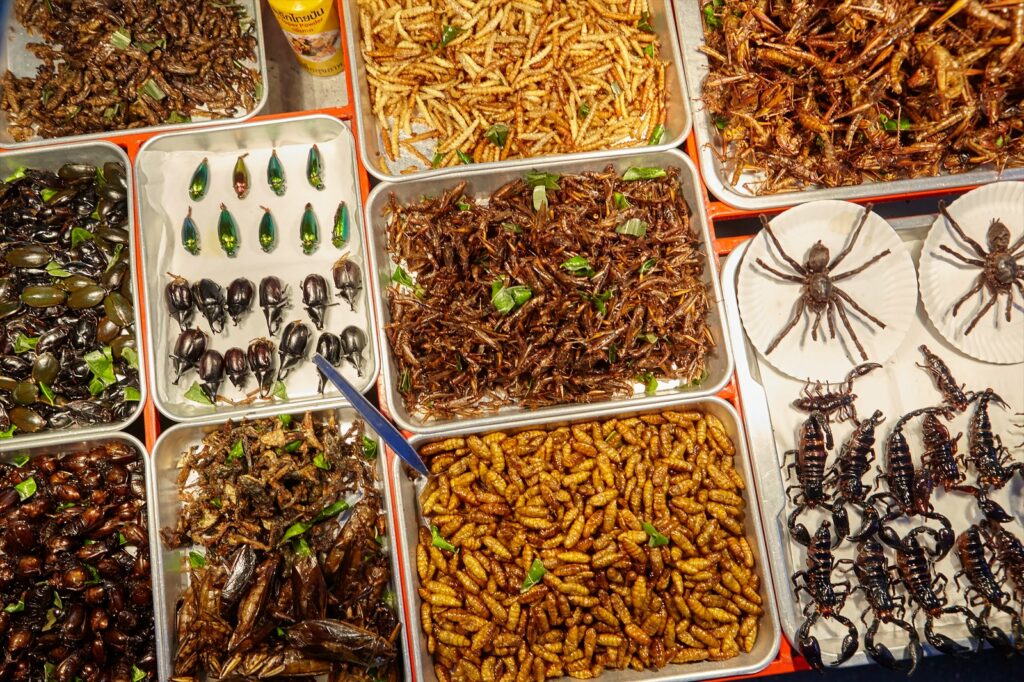It seems the climate is so incredibly fragile that, should it warm slightly, you will no longer get “Norwegian salmon, oysters, lamb, fingerling potatoes, sticky toffee pudding” or for that matter coffee, chocolate or wine, in a fancy restaurant. So says one Sam Kass, ”former White House chef and political adviser to President Barack Obama” (a surprisingly dangerous occupation) who dreamed up a list of menu items supposedly endangered by climate change as a publicity stunt to… er, convince ordinary people to take the climate crisis seriously. Yes, all those ordinary people worried about not being able to order the fingerling potatoes with their Norwegian salmon next time they’re out for a night on the town.
In case you were thinking this was just another elite gimmick from detestable foodies steeped in in privilege and exploitation, the Guardian hastens to say nay:
“it wasn’t a scene out of The Menu, the movie where detestable foodies seek a once-in-a-lifetime experience steeped in privilege and exploitation. Instead of dining on obscure food on the brink of extinction, the ‘last supper’ featured recognizable dishes – salmon, oysters, coffee, wine – that could drastically change or disappear in the coming years as the climate warms and brings more volatile weather.”
Could. Might. Or might not. No matter, the warming is coming and with it more volatile weather that, we repeat yet again, shows no real-world signs of appearing. Just as the notion that “Marque Collins, the chef at Minneapolis’s Tullibee, created the menu, which read like a prix fixe you’d see throughout the US” might surprise people who do not, in their daily lives, encounter Eggs Benedict with “Bakersfield 100 year rye” for a bargain-basement $16. But let us not burst their socioeconomic bubble.
Instead we’re looking to pop their scientific one because author Rachel Leingang, “a democracy reporter focused on misinformation”, and aren’t we all relieved to know such eagle-eyed reporters are on the beat, indeed one with a “Masters of Mass Communication“ in case you didn’t know there was such a degree, genuinely believes that coffee, grapes and oysters will die off if the world gets slightly warmer. And of course women and minorities hit hardest:
“As these foods become more rare, Zimmern [“TV personality Andrew Zimmern”, so not a “climate scientist”] noted, they get more and more expensive, exacerbating inequalities. The future could look like Charlie and his grandparents in Willy Wonka and the Chocolate Factory, passing around a chocolate bar to share, he quipped.”
Oh, the fountain of mirth from activists. Still, it’s heartwarming how concerned they are about inequalities. And about science. Except the part in science where you step back and ask if this makes any sense.
For instance, where was your morning coffee grown? Baffin Island? Norway? Alaska? Strange. More like central America or central Africa or Indonesia or somewhere… warm. Having been first drunk in the Arctic wastes of uh Yemen.
Coffea arabica is currently listed as endangered “[a]lthough it presently has a huge wild population of 13.5 to 19.5 billion individuals throughout its native range” which seems like a lot to those of us not in the environmental-panic game. Moreover the family Rubiaceae, to which coffee belongs, appears to have evolved roughly 50 million years ago during the Eocene Epoch, which as any good democracy reporter focused on misinformation will not know was a lot warmer than the current Holocene. (Coffea arabica, aka “the good stuff”, seems to have appeared between half a million and a million years ago, but as a hybrid of two other existing coffees due to “changing environmental conditions in East Africa” way before humans caused weather to become unstable.) So this silly notion that a small increase in temperature will wipe it from the planet is, well, silly.
As a matter of fact, Wikipedia claims that “In 2020, the world production of green coffee beans was 175,647,000 60 kg bags, led by Brazil with 39% of the total, followed by Vietnam, Colombia, and Indonesia.” And despite the appalling climate crisis killing everything, that number is up from 105 million “bags” in 2004. (In 1950, when temperatures were “better” according to some, it was just 36 million.) So rumours of its impending extinction are the result of twitchy nerves. Maybe switch to decaf.
Now to grapes. This evening you may sip a fine Scottish claret, or a Swedish prosecco, or a Siberian syrah. But we doubt it. Far more likely it will be from somewhere warm. The genus Vitus, of which Vitis vinifera produces wine and may be the earliest domesticated plant, humans being fond of a tipple, appears to date back some 60 million years to the Paleocene Epoch that preceded the Eocene and was even warmer. Warmth does not kill grapes. Frost does. As any fool knows, so find us some fools, quick. (World wine production has increased since 1960 by about 25%.)
As for oysters, whose cultivation may be slightly less familiar to the average fool, the true oysters or Ostreidae appear to date waaaaay back to the Jurassic, land of the Brontosaurus. When temperatures worldwide were perhaps 10C warmer than today without, inexplicably, bringing the foul weather that exterminates everything cute or tasty that we may confidently expect if (a) it gets 0.5C warmer and (b) we read the Guardian.
If only reporters had Google on their computers, they could learn fascinating and arguably relevant things such as that “Aquaculture production of oysters has increased substantially since 1990; from 1.2 million tonnes to 6 million tonnes in 2018”, a form of extinction many creatures would envy.
Then there’s chocolate. As any Oompa Loompa is aware, it comes from cacao seeds (and no, we have never been sure how to pronounce “cacao” and generally say “cocoa” instead). And these seeds are from the Theobroma cacao tree which surely flourishes in northern Saskatchewan, although Wikipedia instead insists that it seems to prefer hot regions, being “widely distributed from southeastern Mexico to the Amazon basin” with the world’s largest producer being Ivory Coast (37%) followed by Ghana and Indonesia.
It seems to be a relative newcomer, barely 10 million years old, and there is concern that monoculture has reduced its genetic diversity. But of course ten million years ago it was (all together now) still considerably warmer than today. And for some strange reason production in 1961 was just over 1 million tonnes of beans, but as the climate crisis hit and hit hard it fell to 5.5 million. Oh, the beanity.
At the bottom of this publicity stunt, other than a desire for publicity, is this extraordinary ignorance among climate alarmists who say they’re following “the science” about the past history of the Earth, from its temperature to its ecology, and about current conditions including the spectacular expansion of various crops they insist are dead or dying. Oh, and about what the data says about changing weather patterns. A particular weakness is their pervasive conviction that climate, and ecology, is so fragile that even minor changes will turn forests into deserts, oceans into deserts, vineyards into deserts, and basically kill everything except the Ceti eel.
For instance a story saying:
“Researchers from Chalmers University of Technology, in Sweden, have discovered a change in what scientists already knew about global warming dynamics. It had been widely accepted since the 1950s that global temperature rises were not consistent throughout the day and night, with greater nighttime warming being observed. However, the recent study reveals a shift in dynamics: with greater daytime warming taking place since the 1990s. This shift means that the temperature difference between day and night is widening, potentially affecting all life on Earth.”
Except if the gap narrowed since the 1950s and is now widening again we should just get back to those glorious days between “pre-Industrial times” and the onset of the climate holocaust. So logic’s a challenge too.
Apart from that, a fine buffet they’re serving.



BO got political advice from his chef?Like,wow!